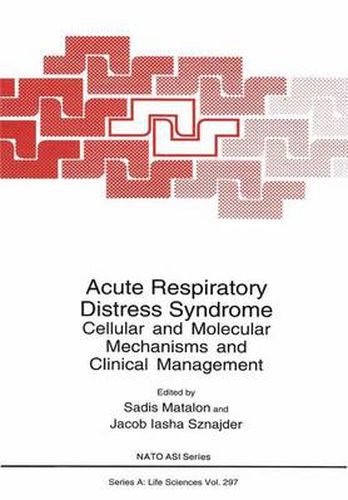Readings Newsletter
Become a Readings Member to make your shopping experience even easier.
Sign in or sign up for free!
You’re not far away from qualifying for FREE standard shipping within Australia
You’ve qualified for FREE standard shipping within Australia
The cart is loading…






This title is printed to order. This book may have been self-published. If so, we cannot guarantee the quality of the content. In the main most books will have gone through the editing process however some may not. We therefore suggest that you be aware of this before ordering this book. If in doubt check either the author or publisher’s details as we are unable to accept any returns unless they are faulty. Please contact us if you have any questions.
Acute lung injury, respiratory failure, and acute respiratorydistresssyndrome associ- ated with sepsis and multiorgan dysfunction isbecoming more common in hospitals through- out the world. Although new classesofantimicrobial medications have been introduced and aggressive intensive life support systems are in use in many hospitals, mortality remains in the range of35 to 65 percent in even the best equipped medical facilities. However, with new technologies inphysiology and cellularand molecularbiology, wonderful opportunities now exist for scientists to explore more effective approaches to identificationofpatients at risk, to develop better insights to pathogenic mechanisms, to use new tools to follow the progression and natural history ofdisease, and to develop better modes oftherapies. The NATOAdvanced Study Institute on Acute RespiratoryDistress Syndrome: Cel- lularandMolecularMechanisms and ClinicalManagement was an outstanding opportunity for laboratory scientists and clinical investigators to discuss their own research approaches, explore opportunities for bringing newdimensions to their laboratories, and work together to identify possible clinical applications. The conference brought together investigators who have worked with patients ofall ages, including those who have so successfully treated in- fants with respiratory distress syndrome. There is no doubt that this stimulating conference will bring new dimensions, new technologies, and new investigators into the scientific labo- ratoriesofeach participant. This provides hope that new therapeutic approaches will eventu- ally be available.
$9.00 standard shipping within Australia
FREE standard shipping within Australia for orders over $100.00
Express & International shipping calculated at checkout
This title is printed to order. This book may have been self-published. If so, we cannot guarantee the quality of the content. In the main most books will have gone through the editing process however some may not. We therefore suggest that you be aware of this before ordering this book. If in doubt check either the author or publisher’s details as we are unable to accept any returns unless they are faulty. Please contact us if you have any questions.
Acute lung injury, respiratory failure, and acute respiratorydistresssyndrome associ- ated with sepsis and multiorgan dysfunction isbecoming more common in hospitals through- out the world. Although new classesofantimicrobial medications have been introduced and aggressive intensive life support systems are in use in many hospitals, mortality remains in the range of35 to 65 percent in even the best equipped medical facilities. However, with new technologies inphysiology and cellularand molecularbiology, wonderful opportunities now exist for scientists to explore more effective approaches to identificationofpatients at risk, to develop better insights to pathogenic mechanisms, to use new tools to follow the progression and natural history ofdisease, and to develop better modes oftherapies. The NATOAdvanced Study Institute on Acute RespiratoryDistress Syndrome: Cel- lularandMolecularMechanisms and ClinicalManagement was an outstanding opportunity for laboratory scientists and clinical investigators to discuss their own research approaches, explore opportunities for bringing newdimensions to their laboratories, and work together to identify possible clinical applications. The conference brought together investigators who have worked with patients ofall ages, including those who have so successfully treated in- fants with respiratory distress syndrome. There is no doubt that this stimulating conference will bring new dimensions, new technologies, and new investigators into the scientific labo- ratoriesofeach participant. This provides hope that new therapeutic approaches will eventu- ally be available.